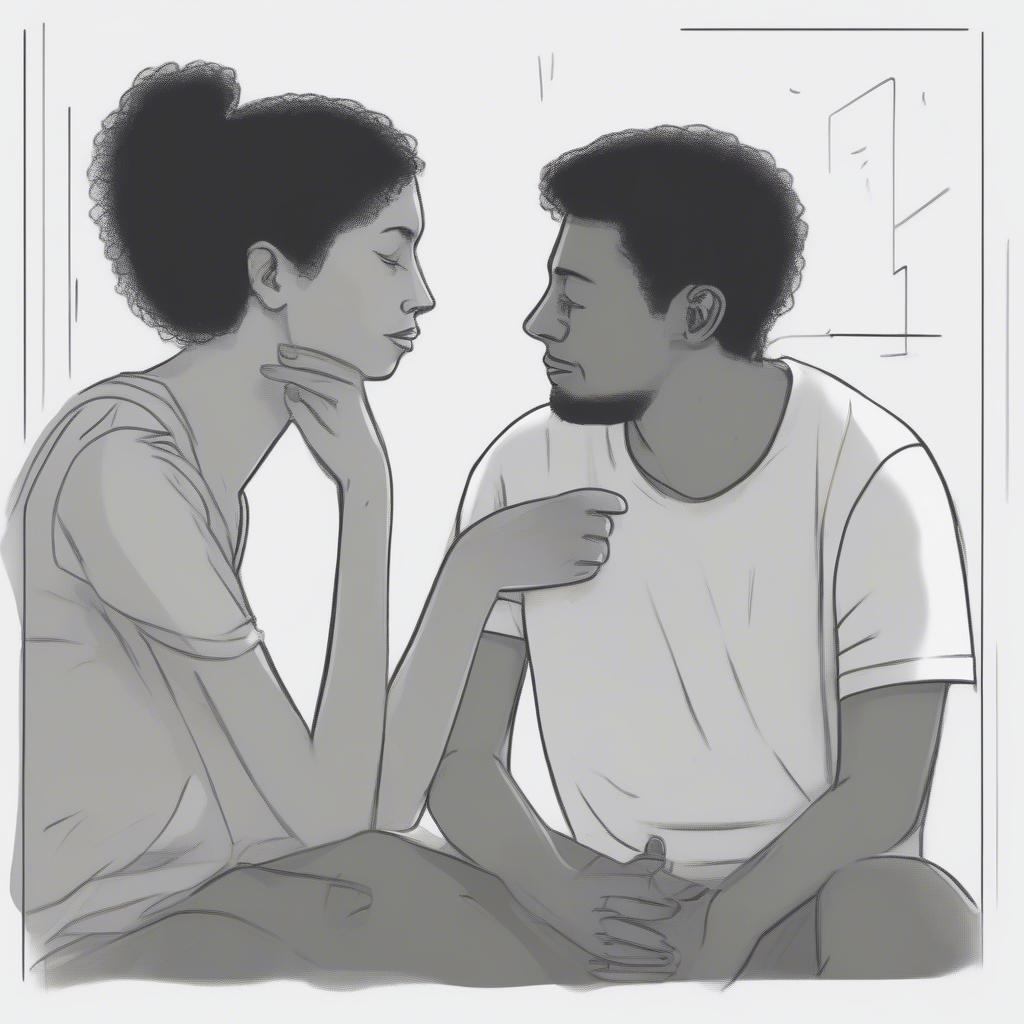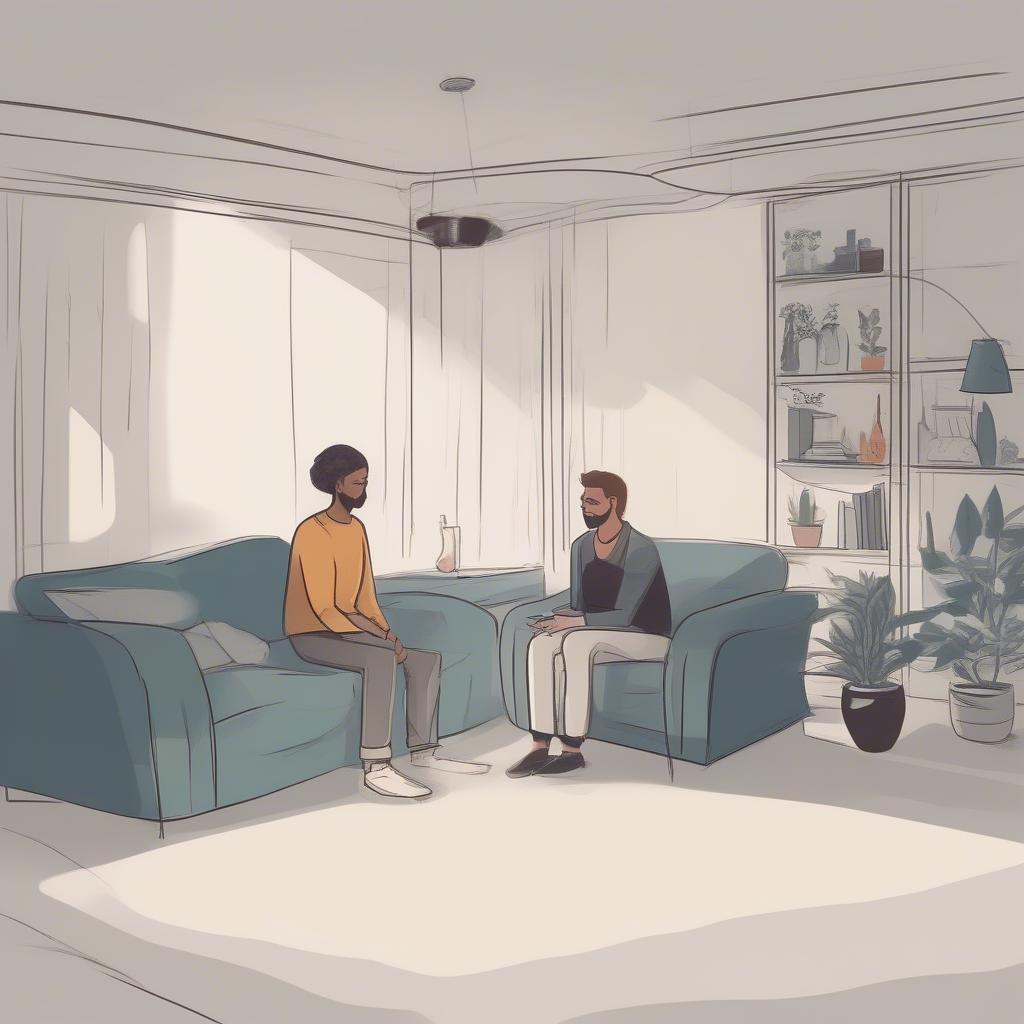When a BPD says “I love you,” it can be a confusing and emotionally charged experience. Understanding the complexities of Borderline Personality Disorder (BPD) and its impact on relationships is crucial to navigating these intense declarations of love. This article delves into the nuances of “I love you” from someone with BPD, exploring the potential meanings, motivations, and implications for both the person with BPD and their partner.
Decoding “I Love You” from a BPD Perspective
Hearing “I love you” is typically a joyous occasion, but when coming from a partner with BPD, it can evoke a mix of emotions, from elation to apprehension. This stems from the inherent challenges of BPD, a disorder characterized by intense emotional instability, fear of abandonment, and difficulties maintaining stable relationships. It’s crucial to remember that individuals with BPD experience emotions deeply and intensely. While their “I love you” may be genuine in the moment, the underlying motivations can be complex.
- Idealization: People with BPD often engage in idealization, perceiving others as perfect and placing them on a pedestal. During this phase, “I love you” can be an expression of this intense admiration and infatuation.
- Fear of Abandonment: The intense fear of being left alone can lead individuals with BPD to express love prematurely or excessively as a way to secure the relationship.
- Genuine Affection: Just like anyone else, individuals with BPD are capable of experiencing genuine love and affection. Their “I love you” can be a heartfelt expression of their feelings.
- Manipulation: In some cases, “I love you” can be used as a manipulative tactic to control or guilt-trip the partner. This is particularly true if the relationship is experiencing conflict or the person with BPD feels threatened by potential separation.
 Idealization in BPD Relationships
Idealization in BPD Relationships
How to Respond When a BPD Partner Says “I Love You”
Responding to “I love you” from a partner with BPD requires sensitivity and understanding. A thoughtful response can help foster a healthy communication pattern and strengthen the relationship, while an insensitive reaction can exacerbate insecurities and trigger emotional instability.
- Validate their feelings: Acknowledge their expression of love without necessarily reciprocating immediately if you’re not ready. You can say something like, “Thank you for sharing that with me. It means a lot to hear that.”
- Avoid dismissing their emotions: Invalidating their feelings can lead to heightened emotional distress and conflict. Refrain from saying things like, “You don’t really mean that” or “You’re just saying that because…”
- Set healthy boundaries: If the declaration of love feels premature or pressured, gently communicate your boundaries. For example, “I appreciate you telling me how you feel, but I need more time to develop those feelings myself.”
- Encourage open communication: Create a safe space for your partner to express their emotions and concerns openly and honestly. Ask questions like, “What does love mean to you?” to gain a deeper understanding of their perspective.
 Responding to "I Love You" from a BPD Partner
Responding to "I Love You" from a BPD Partner
The Importance of Self-Care
When navigating a relationship with someone with BPD, prioritizing your own well-being is crucial. The emotional intensity and instability can be draining, so it’s essential to establish healthy self-care practices.
- Seek therapy or support groups: Connecting with a therapist or joining a support group can provide invaluable guidance and support for navigating the challenges of BPD in relationships.
- Establish clear boundaries: Setting and maintaining healthy boundaries is vital for protecting your emotional and mental health. This includes learning to say “no” and prioritizing your own needs.
- Practice self-compassion: Remember that you are not responsible for your partner’s BPD. Practice self-compassion and forgive yourself for any mistakes you make along the way.
Long-Term Considerations for Relationships with BPD
Building a healthy and sustainable relationship with someone who has BPD requires ongoing effort, understanding, and commitment from both partners. Professional help is often essential.
- Couples therapy: Therapy can provide a structured environment for addressing relationship dynamics, communication patterns, and conflict resolution.
- Individual therapy for the person with BPD: Individual therapy can help the individual with BPD develop coping mechanisms, manage their emotions, and improve their relationship skills.
- Realistic expectations: It’s important to have realistic expectations about the challenges and complexities of BPD. The journey may be bumpy, but with patience, understanding, and support, a fulfilling and loving relationship is possible.
 Long-Term Considerations for Relationships with BPD
Long-Term Considerations for Relationships with BPD
Conclusion
When a BPD says “I love you,” it’s essential to approach the situation with empathy, understanding, and a willingness to learn. While the declaration can be genuine, the underlying complexities of BPD require careful consideration. By fostering open communication, setting healthy boundaries, and prioritizing self-care, you can navigate the intricacies of this challenging yet rewarding relationship dynamic. Remember, understanding the nuances of BPD is key to building a strong and supportive relationship.
FAQ
- Does “I love you” always mean the same thing from someone with BPD? No, the meaning can vary depending on the context and the individual’s emotional state.
- Should I reciprocate “I love you” immediately if I’m not sure? No, it’s okay to take your time and communicate your feelings honestly.
- Can someone with BPD have healthy relationships? Yes, with therapy and support, individuals with BPD can and do have successful relationships.
- What are some red flags to watch out for in a relationship with BPD? Excessive jealousy, controlling behavior, and extreme mood swings can be warning signs.
- How can I support my partner with BPD while also taking care of myself? Setting healthy boundaries and prioritizing self-care are essential for maintaining a balanced and supportive relationship.
- Is it necessary for my partner with BPD to be in therapy? Therapy is highly recommended for individuals with BPD to help them manage their symptoms and improve their relationships.
- What resources are available for partners of people with BPD? Support groups, online forums, and educational materials can provide valuable information and support.
For further assistance, please contact Email: contact@daiduongtranhba.com, address: Michigan Ave, Suite 3100, Chicago, IL 60611, USA. We have a 24/7 customer support team.


